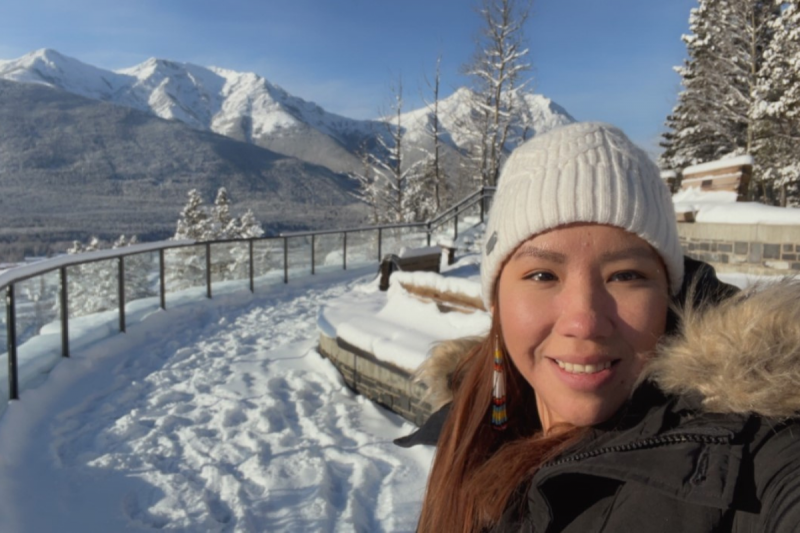
Indigenous Youth Mentorship Program participants (photo taken before COVID-19 pandemic began).
“A place of belonging, friendship and learning”
Indigenous Youth Mentorship Program continues to grow across the province
Tamara Beardy’s involvement with the Indigenous Youth Mentorship Program (IYMP) has a special place in her heart, the program’s benefits hitting close to home.
Her daughter lives with Type 1 Diabetes, diagnosed when she was nine years old. “It’s been an 11-year journey for us and my family,” says Beardy. “The work that I do is my heart’s work, working with children and community, and developing that partnership with my people.”
The IYMP is a culturally based, community-focused physical activity program for youth, with Indigenous teachings and worldviews at the forefront. In it, university and community mentors work with high school mentors to plan and deliver weekly after-school physical, nutrition and education activities for early-years students, tailored to the needs of each school and community.
“It provides a fun, safe space for kids—a place of belonging, friendship and learning,” says Beardy. “We play traditional Indigenous games, which many kids aren’t aware of. It teaches the basic components of nutrition and diabetes prevention, offering healthy snacks and physical activity while having fun. The kids look forward to it every week.”

Tamara Beardy is the IYMP program coordinator for Northern Manitoba.
In Winnipeg’s eight sites, the program is referred to as Rec and Read, but the IYMP is active in communities across the province.
“In 2016, we were in four communities: Wabowden, Thompson, Sagkeeng and Garden Hill, and by the end of the year, we were in seven,” says Beardy, who is a certified phlebotomist and now works as the IYMP program coordinator for Northern Manitoba, along with Lisa Spence and Seneca Chartrand for the Winnipeg area. “Garden Hill—the very first community—is still running the program, which is such an amazing thing to see.”
During its initial years, the program focused on conducting research and building relationships in the communities. “Looking at the data, we see a tremendous change from the beginning to the end of the school year. The positive outcomes really show the value there.”
Working collaboratively to develop their mentorship and leadership skills, university and high school students manage the program and receive ongoing support from UM.
“By the middle or end of the program, the high school students really see themselves as role models in mentoring the younger students. It gives them the opportunity to be a leader and to have a voice,” says Beardy. “That’s one of the core things we want our kids to come out of the program with—being able to vocalize, plan and structure their program. While we’re here to support, it becomes a place of ownership with their space and their ideas.”
With some youth, it has even encouraged them to become educators, she notes. For one mentee, who participated in the program as a child back in 2008, that meant supporting the program as a mentor in high school and later, overseeing the program as a staff member. “They’re now seeking an education degree to become a teacher,” she says.
The adult health leaders who oversee the program are typically educational assistants, teacher champions or even parents. “They don’t have to hold a label within the school,” says Beardy. “We train them every year on safe activity, foods, consent forms, etc. and then they go back to the communities and develop their own training.”
As the program coordinator, Beardy regularly speaks to the adult health leaders—and community leads like education directors and superintendents—and visits every site twice a year to continue to build and strengthen relationships with the people on the ground.
“We’ve become a family—and that’s how it’s always felt, right from the beginning,” she says. “Our end goal is to be in every school in Manitoba, [a vision that program founder and now-retired UM kinesiology and recreation management professor Joannie Halas championed after a high school mentor shared it with her]. I want to see it flourish all over, and transition from research to a not-for-profit so we can have even more opportunities. It’s exciting work and it’s beautiful.”
Since 2006, thousands of high school and elementary students, and hundreds of university students and community mentors, have participated in the program. Though the COVID-19 pandemic put a temporary pause on activities, two new communities—Mathias Colomb and Norway House—are preparing to deliver the program.
Beardy sees its benefits first-hand as she visits the communities in which it’s offered, and hopes to see it continue to grow as it receives support from UM’s partnership with the Mastercard Foundation’s EleV Program.
“It has brought such life to the communities. I’m sure happy and proud that we’re able to provide something like this in community and give our kids a place to grow. It’s just amazing and I’m so proud of our program.”






